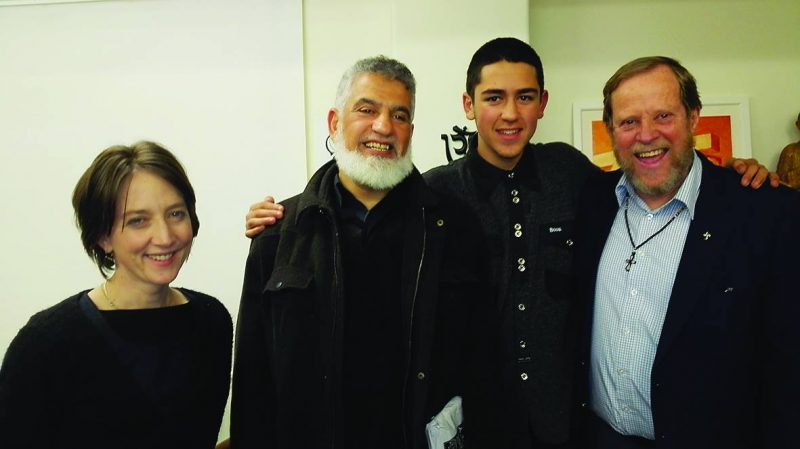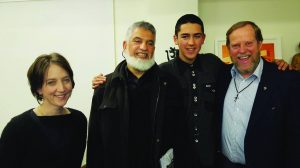by PETER GRACE
An Algerian-born Muslim leader told an audience in Auckland last
month of his journey from happiness to struggle, and back to peace.
The man was Ahmed Zaoui, possibly New Zealand’s best-ever known refugee.
Mr Zaoui told 40 or so people at The Peace Place in central Auckland
on July 30 that he was a member of the Dominican family, acknowledging the love and support the Dominicans gave him in his struggle when he was a refugee in New Zealand.
He said the first 30 or so years of his life were happy. He was one of 10 children of a family in a village called El Idrissia.
“My grandfather, who is the head of the village, he built this village because in the 1920s-30s there was a lot of disease in Algeria, like typhoid, and a lot of people, they die with that,”
he said. His grandfather was a pillar of the village and the surrounding area, a man of peace, harmony and law, “in the name of God the merciful”.
His dad got a good education from his own father, Mr Zaoui said, but his mum understood things “and was more clever than my dad; too much,
too much, I think”.
He went to the official school, but his dad also taught him. “And I didn’t want to go to the Koranic school, because it’s very horrible.”
His dad was a peaceful man. “My grandfather too was very peaceful, because he was like the government of the village.”
His family moved to the town of Medea when he was young, and after completing high school, he enrolled in Mohamed Ibnsaoud University, in Saudi Arabia, where he completed a Bachelor of Arts degree in 1985. Mr Zaoui married an Algerian woman while there.
He returned to Algeria, completing postgraduate studies at the University of Algiers and gaining a position as an imam, and as an associate professor of theology at the University of Algiers.
His focus was on being a teacher or a professor, with a view to helping his people. “I didn’t have any obvious political view at that time.”
Some students used to come to his house to study the Koran. “And then after about two years people heard about me and asked me to be an imam [a leader, often a spiritual leader].”
He would preach occasionally as part of Friday prayers, talking about how to be a good Muslim, how to be honest. “And people like this on the Friday.”
His life began to change for the worse after the Algerian Spring of 1988.
In October that year, thousands of young Algerians hit the streets to protest against the National Liberation Front (FLN), the dominant party; the absence of presidential term limits; a mismanaged socialist economy; and a tyrannical secret service.
The Islamists came out ahead in the first free elections in 1990, and again in the 1991 legislative elections. He stood as a candidate in those elections for the Islamic Salvation Front (FIS), Mr Zaoui said, and won.
His idea of democracy, Mr Zaoui said, is about allowing people to choose. “There’s not just one kind or shape of democracy…It depends on the people and what they choose and live. It’s not to eliminate
justice and the freedom of people.”
However, the FIS was foiled by a military coup in January 1992, because the military did not accept the idea of an Islamist party
winning.
The popular uprising was violently suppressed. A decade of civil war followed, which left as many as 200,000 people dead and a million displaced, not to mention many who disappeared.
He went underground, Mr Zaoui said, “Because if they [the military] caught me they would put me in prison.”
He was sentenced in absentia in Algeria on terrorism and conspiracy
charges. He then went to Morocco, to France, to Belgium and to Germany.
“I asked for political asylum in Belgium.” He was tried twice, being acquitted the first time, but, after an appeal, sentenced to four years in jail. He was also convicted in France.
After some years he escaped to Switzerland, from where he was eventually packed off to Burkina Faso.
From Burkina Faso, he and his family managed to get to Malaysia. The Algerian government then sent an official out to Malaysia, and Mr Zaoui flew to New Zealand.
En route, he tried to destroy his fake South African passport and, on arrival, applied for refugee status.
His initial application was declined. The Refugee Status Board believed there was reason to think he had committed serious criminal
or terrorist activities, primarily on evidence from the SIS.
Mr Zaoui was confined for 10 months in Paremoremo Prison, before being transferred to Auckland Remand Prison.
In August 2003 the Refugee Status Appeals Authority declared
both his Belgian and French trials to be “unsafe” and granted Mr
Zaoui refugee status.
Two years after arriving in New Zealand, the Supreme Court granted
Mr Zaoui bail. Despite Crown opposition, the Court allowed him
to live in the Dominican Priory in Auckland, under Police reporting
conditions.
On September 13, 2007, the head of the Security Intelligence Service withdrew the Security Risk Certificate against Mr Zaoui.
The following month his wife and children, who had been living illegally in Malaysia, joined him in New Zealand.
In 2009, Mr Zaoui and his family moved to Palmerston North, where he intended to study at Massey University. He initially worked part-time with the Manawatu Muslim Association. He opened a kebab stall in
Palmerston North.
In early 2012, Mr Zaoui moved back to Auckland and started working at a food court on Karangahape Rd. He was granted New Zealand citizenship in May 2014.
After two distinct stages of life, Mr Zaoui seems to be in a third stage of peace and gratitude.
In the past 12 months or so, he had returned to Algeria, he said. “I have a lot of contacts in Algeria, and the government approached me. .. and I visit my family after 23 years.
“When I went back to Algeria I felt very relaxed, very comfortable.”
His travel was made possible by friends, family. “It has been easy… I have support in New Zealand. I have good support,” he said.
“We are very grateful in the end my family, my friends, to all people who spoke on behalf of me, who support me, who support me when I was in prison, who sent money… and after who gave me support.”


Reader Interactions